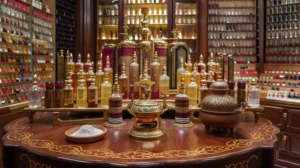Introduction
Musk, a fragrance component steeped in history and revered for its alluring scent, has captivated human senses for millennia. Its rich, animalistic aroma has been a cornerstone of perfumery, lending depth and complexity to countless fragrances. In this blog post, we will delve into the meaning of musk, its association with attar and fragrance, and its diverse perfume notes, exploring why it remains a timeless and beloved scent.
The Meaning of Musk
Origins and Definition
Musk originally referred to a potent aromatic substance obtained from the gland of the male musk deer. This natural musk has a warm, earthy, and slightly sweet aroma that is both sensual and intoxicating. Over time, due to ethical and conservation concerns, natural musk was replaced with synthetic alternatives, allowing its captivating scent to continue enchanting people without harming wildlife.
Symbolism and Cultural Significance
Historically, musk has been prized across various cultures for its aphrodisiac properties and its ability to enhance other scents. In many traditions, it symbolizes purity, luxury, and sensuality. Musk’s enduring appeal can be attributed to its deep, primal aroma that evokes a sense of mystery and allure.
Musk and Attar
Traditional Use in Attar
In the world of attar, musk holds a special place. Attar, or traditional perfume oil, often includes musk as a key ingredient due to its ability to blend seamlessly with other scents and enhance their richness. Musk-based attars are cherished in many Middle Eastern and South Asian cultures, where they are used in religious ceremonies, personal grooming, and special occasions.
Modern Adaptations
With the advent of synthetic musk, modern perfumers have been able to create a variety of musk fragrances that cater to different tastes and preferences. These synthetic musks capture the essence of natural musk while offering greater versatility and ethical production methods.
Perfume Notes of Musk
The Scent Profile
Musk’s scent profile is complex and multifaceted. It is characterized by its warm, sweet, and slightly animalistic aroma. Depending on its concentration and the other notes it is blended with, musk can range from being soft and powdery to deep and earthy.
Common Combinations
- Floral Musk: Combines musk with floral notes like rose, jasmine, or lily to create a delicate yet sensual fragrance.
- Woody Musk: Blends musk with woody notes such as sandalwood, cedarwood, and patchouli, adding depth and warmth.
- Fresh Musk: Incorporates fresh and clean notes like citrus, bergamot, and lavender, resulting in a light and invigorating scent.
- Oriental Musk: Merges musk with spices, amber, and vanilla, creating a rich, exotic, and seductive fragrance.
Musk in Modern Perfumery
Signature Scents
Musk has become a staple in many iconic fragrances, often serving as the base note that grounds and balances the composition. Its ability to enhance and extend the longevity of other notes makes it an indispensable component in perfumery.
Versatility and Popularity
The versatility of musk allows it to be used in a wide range of fragrances, from soft and subtle daytime scents to bold and opulent evening perfumes. Its popularity remains unwavering, as both men and women are drawn to its captivating and enduring charm.
Conclusion
The allure of musk lies in its rich history, cultural significance, and its ability to evoke a sense of sensuality and mystery. From its ancient origins as a natural essence to its modern adaptations in synthetic forms, musk continues to be a beloved and timeless fragrance. Whether as a key component in attar or a versatile note in contemporary perfumes, musk’s deep, primal aroma continues to enchant and captivate, making it a cornerstone of the world of fragrance.



